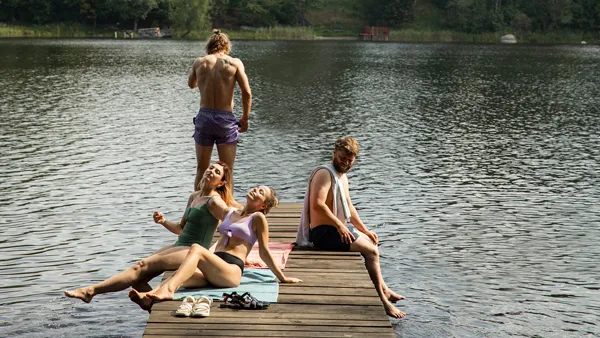Eye For Film >> Movies >> Drowning Dry (2024) Film Review
Drowning Dry
Reviewed by: Amber Wilkinson

Fragments of a summer day turned sour spike the narrative of Lithuania’s Oscar submission as the story reflects and refracts, until a triggering event at its heart is fully revealed. What does and doesn’t happen - and you won’t hear about that from me - is, in some ways besides the point in a film that is built on psychological fallout while also musing on questions of masculinity and sisterhood. Laurynas Bareisa takes a cool approach to emotions in his second feature, which may prove too chilly for some, but the elliptical way he approaches the narrative adds an intriguing element of unpredictability. It is also a film that has a qualified hopefulness about people’s ability to adapt to even the most earth-shattering of occurrences.
The sisters (which is the film’s title, Seses, in Lithuanian) are Ernesta (Gelmine Glemzaite) and Juste (Agne Kaktaite), a close pair who, like so much in Bareisa’s film, are alike but different. The first is married to Lukas (Paulius Markevicius) an MMA fighter who is still bruised up from his last fight, while Juste is married to the considerably doughier Tomas (Giedrius Kiela, who featured in Bareisa’s Venice Horizons’ winning Pilgrims). Both have children of a similar age and who, in the spirit of the drama’s general preoccupation of reflections, are a boy and a girl. Lukas may have the fittest body, but when it comes to finances, it’s Tomas and Juste who are in the better shape. Is it the competitiveness that leads to tragedy? Perhaps not but it’s certainly one of the things the characters consider in the wake of what happens.

The families are heading to a shared cottage for the weekend and if both marriages seem a little frayed at the edges, the women are emotionally in sync. In a key scene that is repeated, they perform a well-rehearsed dance together, although the second time the song has changed, an indication of the way that memory is the mind of each individual witness and liable to unsettling glitches especially in the aftermath of trauma.
The writer/director not only fragments his story, so that we move back and forth in time, but also allows action to happen outside of the frame. Given that much of this film concerns perspective, it’s a mark of Bareisia’s strong control of his framing, acting as his own cinematographer that he often uses mirrors to deliberately skew ours. By withholding information from us, Bareisa puts us in a similar headspace to the main characters who, even if they know exactly what happened, are also trying to make sense of events in their own way. Fate is fickle, loss is permanent but the potential for something new is always there.
.
Reviewed on: 17 Nov 2024

















